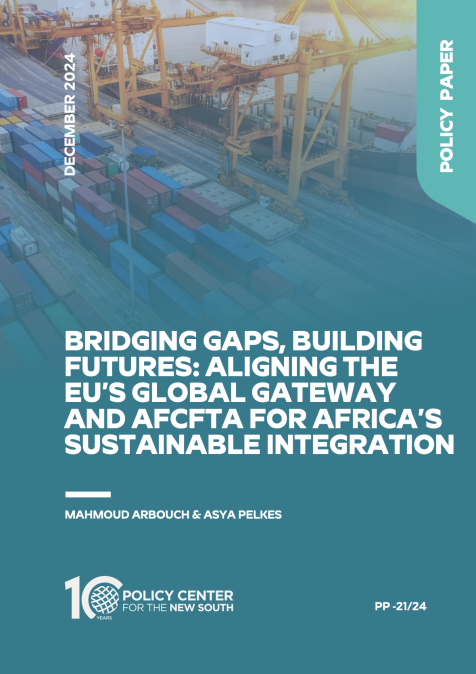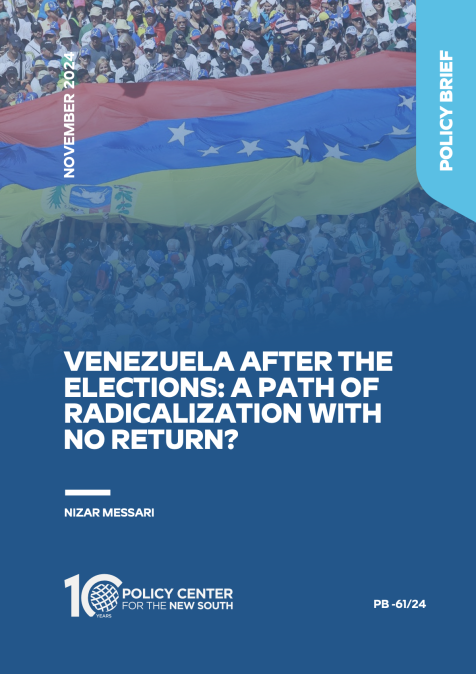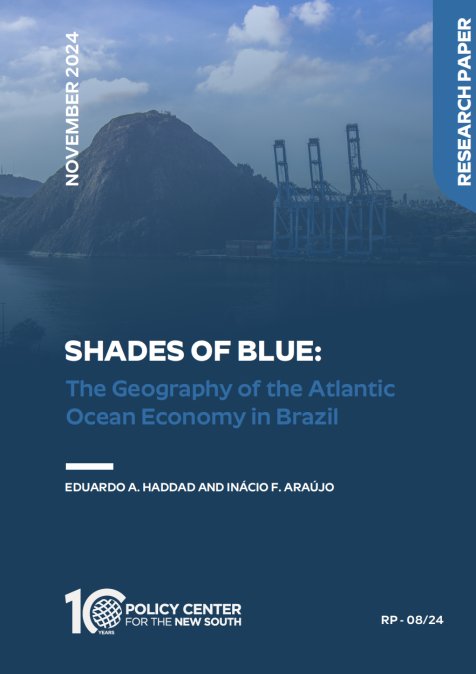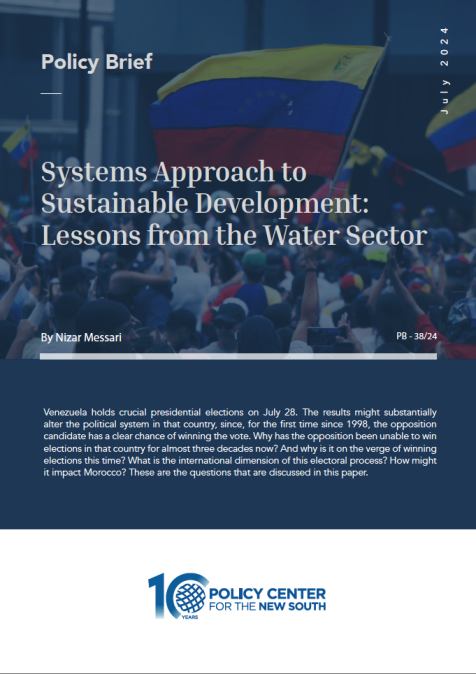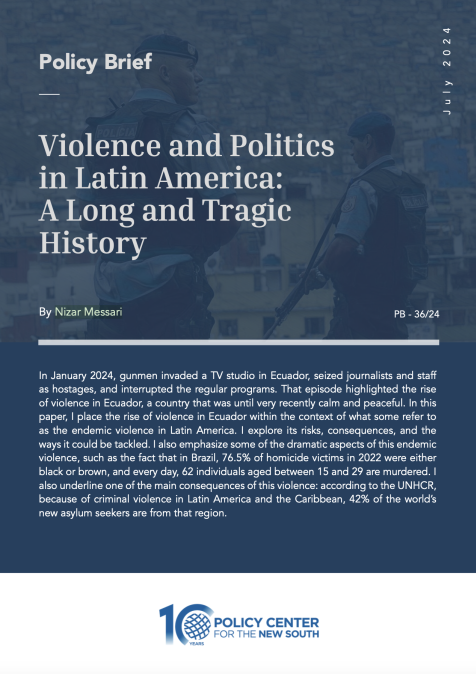When this interview was recorded, Argentina had just sworn in a new president of the Nation, raising many questions about the political future of the South American country. The freshly installed Head of State had led a peculiar campaign, had promised to slash government spending, in a country where half the population receives support from the State. His radical rhetoric against the political elite had galvanized the youth, but also contributed to stoke fear on the future of democracy in Argentina. In this interview, Camila Crescimbeni, former MP and member of the ADEL 2023 cohort, answered questions on her own political engagement and on her perception of what the close future of Argentina might look like.
RELATED CONTENT
-
AuthorsAsya PelkesDecember 19, 2024The European Union’s (EU) Global Gateway initiative, established to enhance global connectivity and sustainable infrastructure, offers a significant opportunity to align with Africa’s development goals under the African Continental Free Trade Area (AfCFTA). However, the challenge lies in whether the Global Gateway can effectively complement AfCFTA’s objectives of boosting intra-African trade and industrialization by addressing critical infrastructure gaps. This paper examines how th ...
-
Lula at Midterm: The G20 Summit in Brazil at the Intersection of Domestic and Foreign Policy AgendasAuthorsNizar MessariDecember 18, 2024The G20 Summit held in November 2024 in Rio de Janeiro, Brazil, under the Brazilian G20 presidency, showed what decentering from the Western agenda and Western domination of world politics could mean. The summit’s main achievement was the constitution of an Alliance against Hunger and Poverty, with a membership of, and funds mobilized from, not only all G20 members, but also from more than 60 other countries. In fact, what the West showed was discomfort at not having its agenda, its ...
-
AuthorsNizar MessariNovember 14, 2024Developments in Venezuela since the presidential election of July 28, 2024, epitomize the fault lines of contemporary world politics. The elections failed to clarify the political situation in Venezuela. Instead, they complicated it. The official electoral authority declared Mr. Nicolás Maduro the official winner of the elections, with a narrow but comfortable margin, while the opposition also declared its candidate, Mr. Edmundo González Urrutia, the legitimate winner of the elect ...
-
AuthorsInaciao F.AraujoNovember 11, 2024This study quantifies the contributions of Brazil’s blue economy and explores the economic interdependence between coastal and hinterland regions through interregional linkages. Employing a multi-level approach, we analyze municipality and state-level data on oceanrelated activities. Using an interstate input-output model, we estimate the value chains of the blue economy, offering a deeper understanding of its systemic impacts. This study addresses gaps in national, regional, and lo ...
-
Akram Zaoui & Otaviano CanutoOctober 11, 2024After the highly polarized 2022 presidential elections, Brazil's political landscape remains influenced by regional voting patterns and lingering divisions. In this episode, Ottaviano Can ...
-
AuthorsJuly 31, 2024Millions are severely malnourished in a world where there is enough for all. Hunger and malnutrition stalk more than 3.1 billion people. Yet, widespread hunger in all its forms is a problem which has been largely solved at the macro level in today’s high-income, industrialized countries. Their “escape from hunger and premature death” is a fairly recent phenomenon. It began around 300 years ago, continued for most of the 20th century and is still ongoing today. The problems faced by ...
-
AuthorsNizar MessariJuly 26, 2024Venezuela holds crucial presidential elections on July 28. The results might substantially alter the political system in that country, since, for the first time since 1998, the opposition candidate has a clear chance of winning the vote. Why has the opposition been unable to win elections in that country for almost three decades now? And why is it on the verge of winning elections this time? What is the international dimension of this electoral process? How might it impact Morocco? ...
-
AuthorsNizar MessariJuly 24, 2024In January 2024, gunmen invaded a TV studio in Ecuador, seized journalists and staff as hostages, and interrupted the regular programs. That episode highlighted the rise of violence in Ecuador, a country that was until very recently calm and peaceful. In this paper, I place the rise of violence in Ecuador within the context of what some refer to as the endemic violence in Latin America. I explore its risks, consequences, and the ways it could be tackled. I also emphasize some of the ...
-
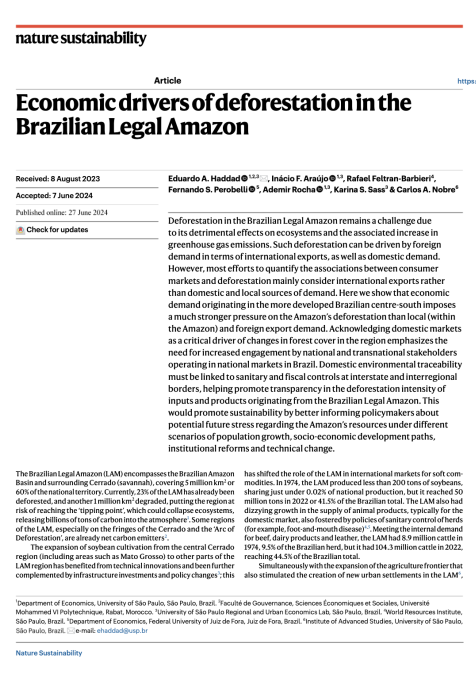 AuthorsInácio F. AraújoRafael Feltran-BarbieriFernando S. PerobelliAdemir RochaKarina S. SassCarlos A. NobreJune 27, 2024This paper was originally published in nature.com Deforestation in the Brazilian Legal Amazon remains a challenge due to its detrimental effects on ecosystems and the associated increase in greenhouse gas emissions. Such deforestation can be driven by foreign demand in terms of international exports, as well as domestic demand. However, most efforts to quantify the associations between consumer markets and deforestation mainly consider international exports rather than domestic ...
AuthorsInácio F. AraújoRafael Feltran-BarbieriFernando S. PerobelliAdemir RochaKarina S. SassCarlos A. NobreJune 27, 2024This paper was originally published in nature.com Deforestation in the Brazilian Legal Amazon remains a challenge due to its detrimental effects on ecosystems and the associated increase in greenhouse gas emissions. Such deforestation can be driven by foreign demand in terms of international exports, as well as domestic demand. However, most efforts to quantify the associations between consumer markets and deforestation mainly consider international exports rather than domestic ... -
March 1, 2024Is Brazil back? The question arises from the promise made by president Lula, upon his re-election, that his country would make a return to international affairs, after years of relative isolation during the Bolsonaro administration. While the personality of Lula can play a key role in b...

